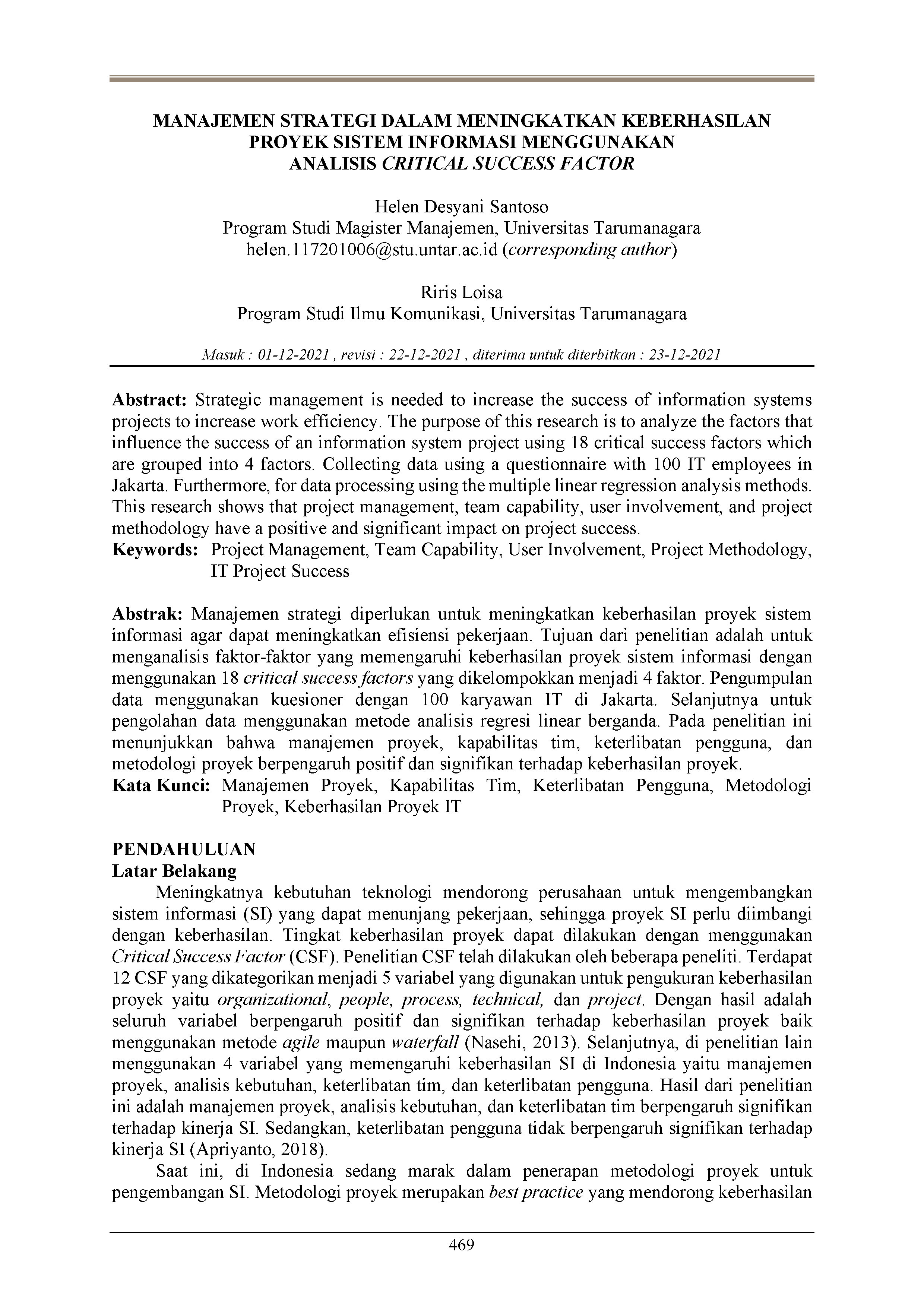Manajemen Strategi dalam Meningkatkan Keberhasilan Proyek Sistem Informasi Menggunakan Analisis Critical Success Factor
Main Article Content
Abstract
Strategic management is needed to increase the success of information systems projects to increase work efficiency. The purpose of this research is to analyze the factors that influence the success of an information system project using 18 critical success factors which are grouped into 4 factors. Collecting data using a questionnaire with 100 IT employees in Jakarta. Furthermore, for data processing using the multiple linear regression analysis methods. This research shows that project management, team capability, user involvement, and project methodology have a positive and significant impact on project success.
Manajemen strategi diperlukan untuk meningkatkan keberhasilan proyek sistem informasi agar dapat meningkatkan efisiensi pekerjaan. Tujuan dari penelitian adalah untuk menganalisis faktor-faktor yang memengaruhi keberhasilan proyek sistem informasi dengan menggunakan 18 critical success factors yang dikelompokkan menjadi 4 faktor. Pengumpulan data menggunakan kuesioner dengan 100 karyawan IT di Jakarta. Selanjutnya untuk pengolahan data menggunakan metode analisis regresi linear berganda. Pada penelitian ini menunjukkan bahwa manajemen proyek, kapabilitas tim, keterlibatan pengguna, dan metodologi proyek berpengaruh positif dan signifikan terhadap keberhasilan proyek.
Article Details

This work is licensed under a Creative Commons Attribution-NonCommercial-ShareAlike 4.0 International License.
This work is licensed under a Jurnal Manajemen Bisnis dan Kewirausahaan Creative Commons Attribution-ShareAlike 4.0 International License.
References
Alryalat, M., Adebiaye, R., & Alryalat, H. (2017). Maximizing IT investment returns: Strategic alignment of information technology towards corporate performances. American Journal of Applied Mathematics and Statistics, 5(2), 72–79. https://doi.org/10.12691/ajams-5-2-5
Apriyanto, R. D. (2018). Faktor-faktor yang mempengaruhi kinerja proyek sistem informasi di Indonesia [Master’s Thesis]. Universitas Islam Indonesia.
Camilleri, E. (2011). Project success: Critical factors and behaviours (1st ed.). Routledge. https://doi.org/10.4324/9781315602493
Creswell, J. W. (2017). Research design: Pendekatan kualitatif, kuantitatif, dan mixed. Pustaka Pelajar.
Culler, E. W. (2011). The degree of relationship between critical success factors and information technology project performance. Proquest, Umi Dissertation Publishing.
Haughey, D. (2010). Waterfall v agile: How should I approach my software development project? Project Smart. https://www.projectsmart.co.uk/agile-project-management/waterfall-v-agile-how-should-i-approach-my-software-development-project.php
Hoegl, M., & Gemuenden, H. G. (2001). Teamwork quality and the success of innovative projects: A theoretical concept and empirical evidence. In Organization Science (Vol. 12, Issue 4, pp. 435–449). https://doi.org/10.1287/orsc.12.4.435.10635
Howell, D., Windahl, C., & Seidel, R. (2010). A project contingency framework based on uncertainty and its consequences. International Journal of Project Management, 28(3), 256–264. https://doi.org/10.1016/j.ijproman.2009.06.002
Ika, L. A., Diallo, A., & Thuillier, D. (2010). Project management in the international development industry: The project coordinator’s perspective. International Journal of Managing Projects in Business, 3(1), 61–93. https://doi.org/10.1108/17538371011014035
Irfan, M., & Hassan, M. (2019). The effect of project governance and sustainability on project success of the public sector organizations in Pakistan. Pertanika Journal of Social Sciences and Humanities, 27(T1), 177–198. http://psasir.upm.edu.my/id/eprint/68683/1/12 JSSH-2288-2017.pdf
Ismail, F., Yusuwan, N. M., & Baharuddin, H. E. A. (2012). Management factors for successful IBS projects implementation. Procedia - Social and Behavioral Sciences, 68, 99–107. https://doi.org/10.1016/j.sbspro.2012.12.210
Jun, L., Qiuzhen, W., & Qingguo, M. (2011). The effects of project uncertainty and risk management on IS development project performance: A vendor perspective. International Journal of Project Management, 29(7), 923–933. https://doi.org/10.1016/j.ijproman.2010.11.002
Nasehi, A. (2013). A quantitative study on critical success factors in agile software development projects; Case study IT company [Master’s Thesis, University of Borås]. http://bada.hb.se/bitstream/2320/12475/1/2013MASI02.pdf
Rockart, J. F. (1982). The changing role of the information systems executive: A critical success factors perspective (CISR WP#85, Sloan WP#1297-82; Center for Informations Systems Research). Sloan School of Management, Massachusetts Institute of Technology.
Sommerville, I. (2011). Software engineering (9th ed.). Addison-Wesley. https://engineering.futureuniversity.com/BOOKS FOR IT/Software-Engineering-9th-Edition-by-Ian-Sommerville.pdf
Tang, L., & Li, H. (2009). Corporate social responsibility communication of Chinese and global corporations in China. Public Relations Review, 35(3), 199–212. https://doi.org/10.1016/j.pubrev.2009.05.016
Valmohammadi, C., & Ahmadi, M. (2015). The impact of knowledge management practices on organizational performance: A balanced scorecard approach. Journal of Enterprise Information Management, 28(1), 131–159. https://doi.org/10.1108/JEIM-09-2013-0066


